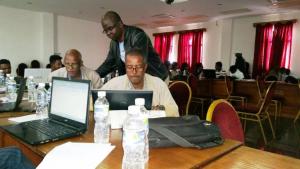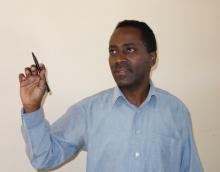Training on Malaria Elimination Surveillance
WHO in collaboration with the Ministry of Health conducted training at Orotta Hospital conference Hall in October 2017 for participants from all districts (zobas), head offices, Malaria programme staffs, Health Management Information System (HMIS) and WHO staff.
Mr Selam Mihretab, Malaria Program Manager, officially opened and welcomed the staff members from WHO-AFRO and participants. He underlined the importance of the training that Eritrea is now in malaria elimination phase and the surveillance is an important component that needs more effort, dedication and determination.
Dr. Gausi Khoti Wanagwa, Technical Officer from AFRO-WHO mentioned that the general objective of the training is to equip participants with knowledge and skills for planning, implementing, monitoring and evaluating the programme and strengthening malaria surveillance elimination. He also stressed that by the end of the training, each participant is expected to have knowledge, skills and competence in Malaria Elimination Surveillance.
Three days training mainly focused on Data analysis and District Health Information System 2 malaria module, through means of presentation, discussion and practical sessions on data analysis. This hand-on exercise provided participants with a practical knowledge and skill on how to analyse and present data on malaria during elimination phase. In addition, in this session QGIS was introduced as a mapping tool for visualizing spatial analysis of malaria data.
Dr. Josephine Namboze, WHO Representative, gave detailed session on Malaria case management, underlining her optimism on elimination of malaria in Eritrea in the near future. She expressed her gratitude to MOH, the trainers, and participants Dr Josephine also highlighted the importance of using this training to strengthen surveillance.
Dr. Yohannes Ghebrat, DPC/Officer gave a speech on the importance of case management, data management and surveillance in the elimination phase. He stressed the need for collaboration between Health Management Information System, Integrated Disease Surveillance and Response and Malaria surveillance for data collection and use. He concluded by expressing his gratitude to the staff from WHO and their generous effort and patience.
Recommendations were given for effective means of ensuring malaria elimination by Integration of IDSR, HIMS and Malaria Programme, elimination should be done by all because of issues of boarders, there is need for coordination as zobas and subzoba move to elimination, strengthening community engagement, classification of local and imported cases and strengthening health systems. At last, participants emphasized on further training needed for capacity building on GIS and GPS, to strengthen Community engagement.
Finally, the closing remark was given by Dr. Araya Brhane, communicable disease control Division Director. He emphasized on importance of the workshop training to strengthen the surveillance system and underlined the need for integration of data management and strengthening the health system as a whole.



